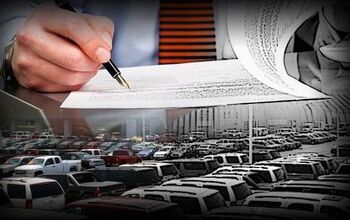U.S. Could Declare Fuel Economy Rules Illegal

The U.S. Transportation Department is getting ready to declare that fuel economy rules established under the Biden administration overstepped legal bounds by factoring electric vehicles into the calculations.
Key Points
- The U.S. Transportation Department is set to rule that previous CAFE standards illegally included EVs, potentially leading to lower overall fuel economy requirements.
- Republicans are pushing to eliminate EV tax credits and overturn fuel efficiency rules, while the EPA may reconsider California's authority to ban gas cars.
- Automakers like GM and Toyota are lobbying against current rules, as the shifting regulatory landscape creates uncertainty for future vehicle development and sales.
Transportation Secretary Sean Duffy confirmed to Reuters that the National Highway Traffic Safety Administration (NHTSA) sent its "Resetting the Corporate Average Fuel Economy Program" interpretive rule to the White House for review late last week.
In a statement, Duffy said the previous administration had "illegally used CAFE standards as a backdoor electric vehicle mandate—driving the price of cars up. Resetting CAFE standards as Congress’ intended will lower vehicle costs and ensure the American people can purchase the cars they want,”
Removing EVs from the average equation for credits and regulatory mandates could lead to lower overall fuel economy requirements for automakers. The about-face comes almost 12 months after NHTSA announced a plan to hike CAFE requirements to around 50.4 miles per gallon by 2031 for light-duty vehicles, up from today's 39.1 mpg.
NHTSA declined to detail the new rule’s content, but did say more information will be available when the rule is published in the Federal Register in the coming weeks.
A group of 120 Republican lawmakers already argued that NHTSA had overstepped its authority by pushing fuel economy standards that "effectively mandate EVs while at the same time force the internal combustion engine out of the market." This is where the EV mandate that isn't a mandate chatter came from.
They claimed the agency "accounted for EVs in its regulatory baseline and factored that baseline into its determination of the maximum achievable CAFE standards." Federal law requires NHTSA to set CAFE standards at the maximum feasible level.
Last year, NHTSA said the new rule would cut fuel consumption by 64 billion gallons and reduce emissions by 659 million metric tons. The agency also argued that while some vehicles would carry a higher sticker price, consumers would ultimately save on fuel costs.
At the same time, the Environmental Protection Agency (EPA) is also looking to re-examine its own vehicle emissions rules. This could potentially lead to the agency taking away California's legal power to ban sales of gas-only vehicles by 2035. The U.S. Senate might even vote this week on House-passed legislation to undo the approval for California's specific rules. Automakers like General Motors and Toyota are actively lobbying for that repeal.
Become an AutoGuide insider. Get the latest from the automotive world first by subscribing to our newsletter here.

An experienced automotive storyteller and accomplished photographer known for engaging and insightful content. Michael also brings a wealth of technical knowledge—he was part of the Ford GT program at Multimatic, oversaw a fleet of Audi TCR race cars, ziptied Lamborghini Super Trofeo cars back together, been over the wall during the Rolex 24, and worked in the intense world of IndyCar.
More by Michael Accardi



































Comments
Join the conversation
Well, Toyota was caught without having any good EV technology, so I understand their argument. GM, however, have started to produce some very nice electric vehicles. The only way for the US to stay competitive in the world market is to build electric vehicles. Conceding to the Chinese isn’t a good market strategy. Removing electric vehicles from the market will not reduce the price of ICE vehicles. Look at the Covid price hikes due to supply chain issues. No one reduced prices when that issue was resolved. I switched to an EV in 2023. I was always a bit of a speed demon and bought cars with high performance engines that ran on premium fuel and got poor fuel economy. Now, I have a BMW that is as fast as an M car with the same suspension, handling, interior, etc. In fact, with the 50/50 weight balance of an EV, it’s extremely predictable in corners. It costs me $8 instead of $80 for a day of pleasure driving.
Eliminating mandates will give us the best possible electrification technology developed in a truly competitive market rather than forcing subsidized collusion where the winners win at the expense of less privilege connected earners, regarded as expendable fodder by the well connected government subsidized elite.